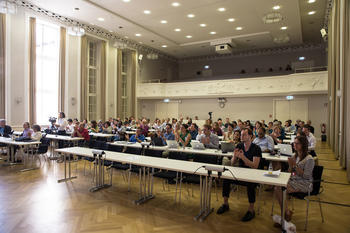Report: KFG Closing Conference „The Transformative Power of Europe Re-Visited“
Aug 21, 2018
The Closing Conference entitled “The Transformative Power of Europe Re-Visited” took place between 7-9 June 2018 at the Harnack House in Berlin-Dahlem. With more than 130 participants, most of them researchers, alumni, and former fellows of the KFG, it was a major event. As indicated by the title, the conference was an opportunity to review the main research questions that have oriented the KFG for the past ten years, and moreover, to present and discuss its major outcomes and achievements in terms of its knowledge production, and in light of the new political challenges that have affected Europe and beyond.
In the Opening Address, the Directors of the KFG Tanja Börzel and Thomas Risse outlined the scientific trajectory of the Research College (2008-2018), whose initial research focused on the diffusion of policy ideas and institutions within the EU, its candidate members and immediate neighborhood. Further, Tanja and Thomas laid out before the audience how the Europeanization approach, which guided the KFG during its first years, evolved into the Diffusion approach - a more encompassing framework that allowed the Research College to provincialize Europe and study the EU not only as a diffusor, but also as a receiver of influences from other regions. The Diffusion approach paved the way for the study of Comparative Regionalism - KFG’s main research area during the second funding period (2012-2018). It is in this period when Tanja and Thomas edited the Oxford Handbook of Comparative Regionalism (OUP 2016) that became a milestone in this research agenda.
Following the introduction, various conference panels addressed topics related to these different stages and research areas of the KFG. Yet, the paper presentations and ensuing discussions were also shaped by the ongoing political processes that have challenged some of the fundamental assumptions of the European integration project, and arguably, its transformative power. Most of these processes were hard to envision when the KFG was first launched. Brexit, as one of these processes, was the central topic in the Panel Europe in Crises: From De-Europeanization to Disintegration? Chaired by Simon Bulmer, Brigid Laffan, Martin Rhodes and Rachel Epstein presented alternative interpretations of the significance of Brexit for the European integration project. While for Laffan, Brexit had a “de-Europeanization” objective manifested in the idea of “taking-back control”, Rhodes and Epstein put forward the argument that the EU crises resemble crises that have affected other federal systems, too. They not only called for a de-dramatization of the disintegration diagnosis, but also for situating the study of the EU within a comparative-federal systems agenda.
Topics pertaining to the populist backlash in several EU member states and the authoritarian backsliding in the European neighborhood were also present in various panels such as Coming Together or Drifting Apart: Europe and its Peripheries, and The Politics of Fear: Politicization and the Populist Challenge. Some of the discussions in these panels focused on the causes of authoritarian backsliding, and questioned whether it was a phenomenon idiosyncratic to certain countries (e.g. post-Soviet area) or a more general trend that can be observed across regions.
Moreover, panels such as Regionalism under Siege and Of Alphabet Soups and Spaghetti Bowls discussed current developments in regional integration organizations in Africa, Latin America, and Asia. The (in)ability of regional powers to lead regionalism, the impact of the current US foreign policy on trade liberalization projects, and the consequences of overlapping regional organizations, captured the attention of paper-givers and the audience. Ultimately, the main question remained whether regionalism is really in crisis or just subject to waves of transformations.
An outstanding output of publications, academic exchange, and early-career scholars’ promotion were some of the many KFG’s achievements highlighted by the participants of the two Round Tables What’s so special about the KFG? Evaluating a DFG Funding Line and From Transformative Power of Europe to …? Where do we go next? In the latter, a group of scholars from both sides of the Atlantic discussed the legacies as well as the open questions left by the KFG. Fredrik Söderbaum stressed the leadership of Tanja and Thomas, and the capacity of the KFG to consolidate the academic field of Comparative Regionalism. At the same time, he expressed the concern that in a post-KFG era, European studies and area studies scholars could once again drift apart. As a participant observer in the Conference, I can see Söderbaum’s concern reflected in the fact that European colleagues tended to attend the panels on Europe, while cross-regional conversations were relatively rare. Other speakers, too, rather focused on future research agendas. Among them, Aurel Croissant, who contended that such a future agenda should problematize the long-standing assumption of the EU as a “Community of Liberal Democracies” and unpack the different challenges to the liberal order, stemming from different corners of Europe and beyond. Combining Söderbaum’s and Croissant’s observations, we could suggest that such an agenda - focused on illiberalism and the challenges to the liberal order - would benefit from the KFG legacy by taking a genuinely cross-regional perspective.
In sum, this was an exciting Conference celebrated in the midst of exciting times for the social and political sciences. Thanks to the KFG Conference Team, it was perfectly organized. Furthermore, it was a vivid example of the KFG’s sense of academic community that promotes academic and social interaction among scholars at different stages of their career, which ultimately made the Research College so distinctive and appreciated.
By Stefano Palestini, KFG Post-Doc Fellow
